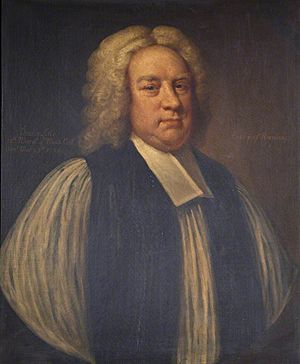Samuel Lisle facts for kids
Quick facts for kids The Right Reverend Samuel Lisle |
|
|---|---|
| Bishop of Norwich | |
 |
|
| Diocese | Diocese of Norwich |
| In Office | 1748–1749 |
| Predecessor | Thomas Gooch |
| Successor | Thomas Hayter |
| Other posts | Bishop of St Asaph (1743–1748) |
| Personal details | |
| Born | 1683 Blandford, Dorset |
| Died | 3 October 1749 (aged 66) London |
| Buried | St Mary the Virgin, Northolt |
| Nationality | British |
| Denomination | Anglican |
| Alma mater | Wadham College, Oxford |
Samuel Lisle (1683 – 3 October 1749) was an important English church leader. He was a scholar and became a bishop.
Contents
Samuel Lisle's Early Life
Samuel Lisle was born in 1683 in a town called Blandford in Dorset, England. He went to Wadham College, Oxford, a famous university. In 1706, he earned his Master of Arts degree. The next year, in 1707, he became a priest.
His Work and Roles
Samuel Lisle had many important jobs during his life.
Working Abroad
From 1710 to 1719, he worked as a chaplain for the Levant Company. This company was involved in trade with countries in the Middle East. When he came back to England, he suggested that the Bible should be translated better into Arabic.
Church Leadership
Samuel Lisle held several key positions in the Church of England:
- In 1720, he became the rector of Tooting. A rector is a priest in charge of a local church.
- He became the Archdeacon of Canterbury in 1724. An archdeacon helps the bishop manage a part of the diocese.
- From 1721 to 1744, he was also the rector of St Mary-le-Bow church.
- In 1729, he became the rector of Northall.
- In 1739, he returned to his old university, becoming the Warden of Wadham College. The Warden is like the head of the college.
Becoming a Bishop
Samuel Lisle was made a bishop twice:
- In 1744, he became the Bishop of St Asaph. A bishop is a senior leader in the church, overseeing many churches in a region called a diocese.
- In 1748, he became the bishop of Norwich.
His Final Years
Samuel Lisle passed away in London on October 3, 1749. He was buried at a church called St Mary the Virgin, Northolt, in Middlesex.
His Published Work
During his time as a chaplain in the Levant, Samuel Lisle collected many ancient writings and carvings. These were later printed in a book called Antiquitates Asiaticae in 1728. The book was put together by Edmund Chishull.
 | William L. Dawson |
 | W. E. B. Du Bois |
 | Harry Belafonte |

